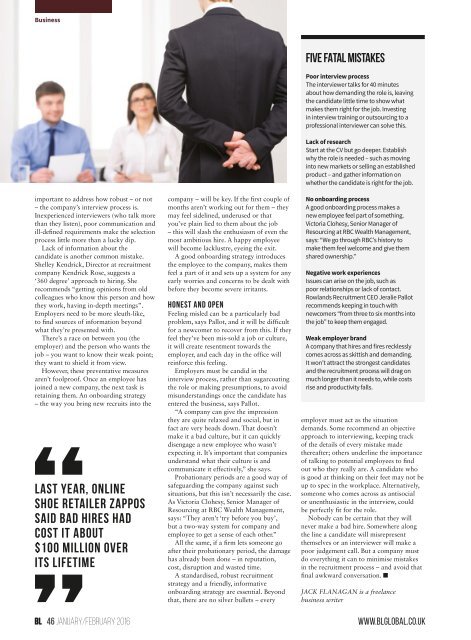BL Magazine
Create successful ePaper yourself
Turn your PDF publications into a flip-book with our unique Google optimized e-Paper software.
Business<br />
important to address how robust – or not<br />
– the company’s interview process is.<br />
Inexperienced interviewers (who talk more<br />
than they listen), poor communication and<br />
ill-defined requirements make the selection<br />
process little more than a lucky dip.<br />
Lack of information about the<br />
candidate is another common mistake.<br />
Shelley Kendrick, Director at recruitment<br />
company Kendrick Rose, suggests a<br />
‘360 degree’ approach to hiring. She<br />
recommends “getting opinions from old<br />
colleagues who know this person and how<br />
they work, having in-depth meetings”.<br />
Employers need to be more sleuth-like,<br />
to find sources of information beyond<br />
what they’re presented with.<br />
There’s a race on between you (the<br />
employer) and the person who wants the<br />
job – you want to know their weak point;<br />
they want to shield it from view.<br />
However, these preventative measures<br />
aren’t foolproof. Once an employee has<br />
joined a new company, the next task is<br />
retaining them. An onboarding strategy<br />
– the way you bring new recruits into the<br />
Last year, online<br />
shoe retailer Zappos<br />
said bad hires had<br />
cost it about<br />
$100 million over<br />
its lifetime<br />
company – will be key. If the first couple of<br />
months aren’t working out for them – they<br />
may feel sidelined, underused or that<br />
you’ve plain lied to them about the job<br />
– this will slash the enthusiasm of even the<br />
most ambitious hire. A happy employee<br />
will become lacklustre, eyeing the exit.<br />
A good onboarding strategy introduces<br />
the employee to the company, makes them<br />
feel a part of it and sets up a system for any<br />
early worries and concerns to be dealt with<br />
before they become severe irritants.<br />
HONEST AND OPEN<br />
Feeling misled can be a particularly bad<br />
problem, says Pallot, and it will be difficult<br />
for a newcomer to recover from this. If they<br />
feel they’ve been mis-sold a job or culture,<br />
it will create resentment towards the<br />
employer, and each day in the office will<br />
reinforce this feeling.<br />
Employers must be candid in the<br />
interview process, rather than sugarcoating<br />
the role or making presumptions, to avoid<br />
misunderstandings once the candidate has<br />
entered the business, says Pallot.<br />
“A company can give the impression<br />
they are quite relaxed and social, but in<br />
fact are very heads down. That doesn’t<br />
make it a bad culture, but it can quickly<br />
disengage a new employee who wasn’t<br />
expecting it. It’s important that companies<br />
understand what their culture is and<br />
communicate it effectively,” she says.<br />
Probationary periods are a good way of<br />
safeguarding the company against such<br />
situations, but this isn’t necessarily the case.<br />
As Victoria Clohesy, Senior Manager of<br />
Resourcing at RBC Wealth Management,<br />
says: “They aren’t ‘try before you buy’,<br />
but a two-way system for company and<br />
employee to get a sense of each other.”<br />
All the same, if a firm lets someone go<br />
after their probationary period, the damage<br />
has already been done – in reputation,<br />
cost, disruption and wasted time.<br />
A standardised, robust recruitment<br />
strategy and a friendly, informative<br />
onboarding strategy are essential. Beyond<br />
that, there are no silver bullets – every<br />
FIVE FATAL MISTAKES<br />
Poor interview process<br />
The interviewer talks for 40 minutes<br />
about how demanding the role is, leaving<br />
the candidate little time to show what<br />
makes them right for the job. Investing<br />
in interview training or outsourcing to a<br />
professional interviewer can solve this.<br />
Lack of research<br />
Start at the CV but go deeper. Establish<br />
why the role is needed – such as moving<br />
into new markets or selling an established<br />
product – and gather information on<br />
whether the candidate is right for the job.<br />
No onboarding process<br />
A good onboarding process makes a<br />
new employee feel part of something.<br />
Victoria Clohesy, Senior Manager of<br />
Resourcing at RBC Wealth Management,<br />
says: “We go through RBC’s history to<br />
make them feel welcome and give them<br />
shared ownership.”<br />
Negative work experiences<br />
Issues can arise on the job, such as<br />
poor relationships or lack of contact.<br />
Rowlands Recruitment CEO Jeralie Pallot<br />
recommends keeping in touch with<br />
newcomers “from three to six months into<br />
the job” to keep them engaged.<br />
Weak employer brand<br />
A company that hires and fires recklessly<br />
comes across as skittish and demanding.<br />
It won’t attract the strongest candidates<br />
and the recruitment process will drag on<br />
much longer than it needs to, while costs<br />
rise and productivity falls.<br />
employer must act as the situation<br />
demands. Some recommend an objective<br />
approach to interviewing, keeping track<br />
of the details of every mistake made<br />
thereafter; others underline the importance<br />
of talking to potential employees to find<br />
out who they really are. A candidate who<br />
is good at thinking on their feet may not be<br />
up to spec in the workplace. Alternatively,<br />
someone who comes across as antisocial<br />
or unenthusiastic in the interview, could<br />
be perfectly fit for the role.<br />
Nobody can be certain that they will<br />
never make a bad hire. Somewhere along<br />
the line a candidate will misrepresent<br />
themselves or an interviewer will make a<br />
poor judgement call. But a company must<br />
do everything it can to minimise mistakes<br />
in the recruitment process – and avoid that<br />
final awkward conversation. n<br />
JACK FLANAGAN is a freelance<br />
business writer<br />
46 January/february 2016 www.blglobal.co.uk

















